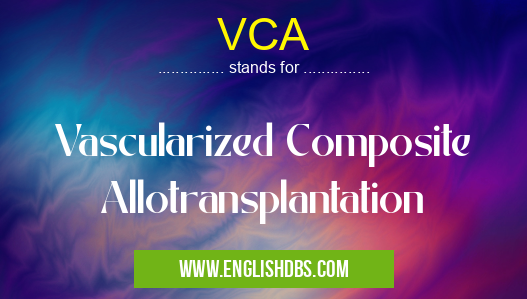What does VCA mean in UNCLASSIFIED
VCA (Vascularized Composite Allotransplantation) is a surgical procedure that involves the transplantation of a vascularized composite tissue, which includes multiple tissue types (such as skin, muscle, nerve, and bone) from a donor to a recipient. VCA is a complex and challenging procedure that requires a high level of surgical expertise and immunosuppression to prevent rejection of the transplanted tissue.

VCA meaning in Unclassified in Miscellaneous
VCA mostly used in an acronym Unclassified in Category Miscellaneous that means Vascularized Composite Allotransplantation
Shorthand: VCA,
Full Form: Vascularized Composite Allotransplantation
For more information of "Vascularized Composite Allotransplantation", see the section below.
Meaning of VCA
VCA stands for Vascularized Composite Allotransplantation. It refers to the transplantation of a composite tissue that contains multiple tissue types, including blood vessels, nerves, and other components.
Key Features of VCA
- Composite tissue: VCA involves the transplantation of a tissue that contains multiple tissue types, rather than a single type of tissue.
- Vascularized: The transplanted tissue is connected to the recipient's blood supply to ensure its survival and function.
- Allotransplantation: The tissue is transplanted from a donor of a different genetic makeup, making it an allogeneic transplant.
Applications of VCA
VCA is used to treat a variety of conditions, including:
- Limb transplantation: Replacing lost or damaged limbs with a healthy limb from a donor.
- Face transplantation: Restoring facial features and functions in patients with severe facial injuries or disfigurement.
- Urogenital transplantation: Treating conditions such as bladder cancer or kidney failure by transplanting a portion of the urogenital system.
Challenges in VCA
VCA is a complex procedure that presents several challenges:
- Surgical complexity: The transplantation of multiple tissue types requires precise surgical techniques and coordination.
- Immunosuppression: To prevent rejection of the transplanted tissue, recipients require long-term immunosuppression, which can have side effects.
- Functional integration: Ensuring the transplanted tissue integrates seamlessly with the recipient's body and functions properly can be challenging.
Essential Questions and Answers on Vascularized Composite Allotransplantation in "MISCELLANEOUS»UNFILED"
What is Vascularized Composite Allotransplantation (VCA)?
VCA is a surgical procedure that involves transplanting a tissue composite that contains multiple types of tissues, such as skin, muscle, bone, and blood vessels, from one person (the donor) to another (the recipient).
What types of tissues can be transplanted using VCA?
VCA can be used to transplant various tissue composites, including limbs (arms and legs), faces, hands, and abdominal walls.
Who is a candidate for VCA?
Individuals who have lost or severely damaged a tissue composite due to trauma, burns, or disease may be candidates for VCA.
What are the benefits of VCA?
VCA offers several benefits, including the restoration of function, improved aesthetics, and enhanced quality of life.
What are the risks associated with VCA?
VCA, like any major surgery, carries risks, such as rejection, infection, and complications related to immunosuppressive drugs used to prevent rejection.
What is the success rate of VCA?
The success rate of VCA varies depending on the type of tissue transplanted and other factors. However, advancements in surgical techniques and immunosuppressive therapies have improved the overall success rates in recent years.
What is the long-term prognosis after VCA?
Long-term outcomes after VCA can vary, but many patients experience sustained improvement in function and quality of life. Regular monitoring and follow-up care are essential to ensure optimal outcomes.
What are the ethical considerations related to VCA?
VCA raises ethical questions related to donor selection, informed consent, and the long-term implications for both donors and recipients. Ethical guidelines and regulations are in place to ensure the ethical conduct of VCA procedures.
Final Words: VCA is a groundbreaking surgical technique that has the potential to significantly improve the lives of patients with severe injuries or conditions. However, it is a complex procedure with ongoing challenges that require further research and advancements in surgical techniques and immunosuppression strategies.
VCA also stands for: |
|
| All stands for VCA |
